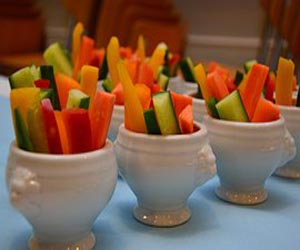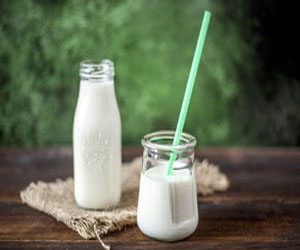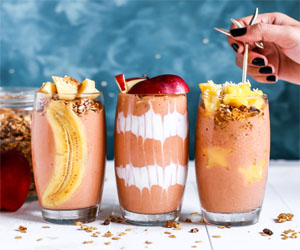



A gluten-free diet is often associated with medical necessity, catering to individuals with celiac disease or non-celiac gluten sensitivity. However, it's essential to understand that a gluten-free diet can be more than a mere dietary restriction; it can be a journey towards better health and well-being. Nourishing your body with the right foods is a fundamental aspect of this lifestyle. In this article, we'll explore how to achieve optimal body nourishment on a gluten-free diet.
1. Whole, Unprocessed Foods: The cornerstone of a healthy gluten-free diet is whole, unprocessed foods. These include fresh fruits and vegetables, lean proteins like chicken, fish, and tofu, and naturally gluten-free grains such as quinoa, rice, and oats (certified gluten-free). Focusing on these foods ensures your body receives essential nutrients and minimizes the need for processed products.
2. Gluten-Free Grains: Grains are a significant source of carbohydrates and dietary fiber. On a gluten-free diet, it's important to incorporate gluten-free grains like brown rice, amaranth, and sorghum. These grains offer a range of nutrients and provide energy while avoiding the harmful effects of gluten.
3. Legumes And Pulses: Legumes, such as lentils, chickpeas, and beans, are excellent sources of plant-based protein, fiber, and essential vitamins. They make versatile and nutrient-rich additions to gluten-free meals, contributing to body nourishment.
4. Nutrient-Dense Snacks: Gluten-free snacking doesn't have to mean indulging in processed chips and sugary treats. Opt for nutrient-dense snacks like nuts, seeds, Greek yogurt, or gluten-free granola to keep your energy levels steady and nourish your body between meals.
5. Gluten-Free Baking: Gluten-free flours, like almond flour, coconut flour, and tapioca flour, can be used to make delicious baked goods. You can still enjoy muffins, pancakes, and cookies while nourishing your body and avoiding gluten.
6. Lean Proteins: Protein is vital for muscle health and overall well-being. Incorporate lean proteins like poultry, fish, tofu, and legumes into your diet to ensure that your body receives the necessary amino acids.
7. Dairy Or Dairy Alternatives: Dairy products like milk, cheese, and yogurt (if tolerated) provide calcium and protein. If you're lactose intolerant or choose to avoid dairy, there are various dairy alternatives available, such as almond milk or coconut yogurt.
8. Micronutrients: Pay attention to getting a variety of micronutrients in your gluten-free diet. Vitamins and minerals are crucial for overall health. Make sure your meals include a spectrum of colorful fruits and vegetables to maximize the diversity of nutrients your body receives.
9. Hydration: Proper body nourishment includes staying well-hydrated. Water is essential for digestion, circulation, and overall health. It's gluten-free and a fundamental part of maintaining your well-being.
10. Mindful Eating Practices: Nourishing your body on a gluten-free diet also involves mindful eating practices. Pay attention to your body's hunger and fullness cues. Eating mindfully allows you to enjoy your food and make healthier choices.
A gluten-free diet can be a path to wellness and optimal body nourishment when approached thoughtfully. It's not just about eliminating gluten-containing foods but also about embracing a wide range of whole, unprocessed, and naturally gluten-free foods. By focusing on nutrient-dense options, gluten-free grains, lean proteins, and mindful eating practices, you can nourish your body while avoiding gluten, leading to better health and overall well-being. If you have specific dietary concerns or health conditions, it's advisable to consult with a healthcare professional or registered dietitian to ensure that your gluten-free diet meets your nutritional needs.
A Journey To Inner Strength
 Emotional Regulation: Self-reflection allows individuals to recognize their emotional responses to challenging situations. This awareness is the first step in regulating and managing those emotions effectively.
Emotional Regulation: Self-reflection allows individuals to recognize their emotional responses to challenging situations. This awareness is the first step in regulating and managing those emotions effectively.
Self-Awareness: Self-reflection helps individuals gain a deeper understanding of their strengths, weaknesses, and triggers. This self-awareness can be pivotal in developing a resilient mindset.
Learning From Experiences: Reflecting on past experiences, especially adversity, provides an opportunity for growth and learning. It allows individuals to extract valuable lessons from setbacks and difficulties.
Improved Problem-Solving: Through self-reflection, individuals can evaluate their problem-solving approaches and adapt them to better tackle future challenges.
Practical Steps For Building Resilience Through Self-Reflection
Journaling: Maintain a journal to record your thoughts, emotions, and experiences. Regularly writing down your reflections on daily events can help you identify patterns in your behavior and thought processes.
Mindfulness Meditation: Engage in mindfulness meditation practices to cultivate awareness of the present moment. This can help you develop a deep understanding of your thoughts and emotions and promote emotional regulation.
Regular Self-Check-Ins: Dedicate time for self-check-ins throughout the day. Pause to ask yourself how you're feeling, what's on your mind, and how you're reacting to various situations.
Learn From Setbacks: When facing adversity, take the time to reflect on your experiences. What did you learn from the challenge? How did you cope, and what could be improved in your response?
Nurturing Mind, Body, And Soul For A Balanced Life
 Key Components Of Holistic Wellness
Key Components Of Holistic Wellness
Physical Health: This includes aspects such as nutrition, exercise, sleep, and managing chronic conditions. A balanced diet, regular physical activity, and proper rest are fundamental to physical well-being.
Mental Health: Mental wellness involves emotional stability, resilience, and a positive mindset. It encompasses managing stress, nurturing creativity, and fostering a sense of purpose.
Emotional Health: Emotional well-being relates to understanding and managing one's emotions. It involves recognizing and expressing feelings, as well as developing strategies to handle emotional challenges.
Spiritual Health: Spiritual wellness isn't necessarily tied to religion; it's about finding a sense of purpose, meaning, and connection to something greater than ourselves. This can involve self-reflection, mindfulness, or meditation.
Social Connections: Building and maintaining meaningful relationships with friends, family, and the community is a key component of holistic wellness. A strong support system contributes to happiness and provides a safety net during difficult times.
Environmental Wellness: This focuses on our relationship with the environment, emphasizing the importance of a clean, safe, and sustainable living space.
Cultivating Holistic Wellness
Mindful Living: Practice mindfulness by being fully present in the moment. This involves paying attention to your thoughts, feelings, and physical sensations. Mindful living can help reduce stress and enhance emotional and mental well-being.
Balanced Diet: Consume a variety of nutrient-dense foods, emphasizing fruits, vegetables, lean proteins, whole grains, and healthy fats. Minimize processed foods and added sugars.
Nourishing Your Way To Restful Nights
 Almonds: Almonds are a good source of magnesium, which plays a role in supporting deep sleep. A magnesium deficiency may lead to restless sleep and insomnia. Consuming almonds can help regulate sleep patterns.
Almonds: Almonds are a good source of magnesium, which plays a role in supporting deep sleep. A magnesium deficiency may lead to restless sleep and insomnia. Consuming almonds can help regulate sleep patterns.
Fatty Fish: Salmon, mackerel, and trout are high in omega-3 fatty acids, which can help regulate the body's production of melatonin. These healthy fats can promote a more restful night's sleep.
Leafy Greens: Leafy greens like spinach and kale are rich in calcium. Calcium plays a crucial role in helping the brain use tryptophan to produce melatonin. Incorporating these greens into your diet can support melatonin production.
Warm Milk: A classic remedy for better sleep, a warm glass of milk provides a source of tryptophan and can be soothing before bedtime.
Whole Grains: Whole grains like oats and brown rice have a low glycemic index, which means they release energy slowly. This helps stabilize blood sugar levels and can prevent nighttime wake-ups due to blood sugar fluctuations.
Honey: Honey contains a small amount of tryptophan and has a natural ability to promote relaxation. Adding a teaspoon of honey to a cup of herbal tea can be a comforting bedtime ritual.
Herbal Teas: Herbal teas like chamomile, valerian root, and lavender are known for their calming effects. They can help reduce anxiety and induce a more peaceful sleep.
Walnuts: Walnuts are a source of melatonin, which can be beneficial for regulating sleep patterns. Consuming a small handful of walnuts before bed may promote better sleep.
It's important to note that while incorporating these superfoods into your diet can support better sleep, they are most effective when part of a balanced diet.
 Aromatherapy, rooted in ancient practices, is a holistic approach to wellness that utilizes essential oils to enhance the physical, emotional, and mental aspects of our lives. It recognizes the interconnectedness of these facets and aims to create a harmonious balance within us. Essential oils are at the heart of this practice, and their healing properties are at the forefront of the pursuit of holistic well-being.
Aromatherapy, rooted in ancient practices, is a holistic approach to wellness that utilizes essential oils to enhance the physical, emotional, and mental aspects of our lives. It recognizes the interconnectedness of these facets and aims to create a harmonious balance within us. Essential oils are at the heart of this practice, and their healing properties are at the forefront of the pursuit of holistic well-being.
Physical Well-Being
Essential oils offer a wide range of benefits for physical health. They can be used for relaxation and stress reduction through massages or diffusers. For example, lavender oil is known for its calming properties, while eucalyptus oil can help with respiratory issues. These oils can also assist in alleviating pain, improving sleep quality, and enhancing skin health. Incorporating essential oils into your daily routine, whether through topical application or inhalation, can be a holistic way to address physical well-being.
Emotional Well-Being
Emotions play a significant role in holistic well-being, and essential oils can be powerful allies in managing them. Aromatherapy can help reduce anxiety, uplift spirits, and foster emotional balance. Scents like citrus and bergamot can boost mood, while oils like chamomile and frankincense are known for their calming and grounding effects. By using essential oils to create a positive and nurturing emotional environment, individuals can take steps toward achieving emotional well-being.
Mental Well-Being
Mental health is a crucial component of holistic well-being. The soothing and rejuvenating effects of essential oils can help alleviate stress, reduce mental fatigue, and improve focus and concentration. Oils like peppermint and rosemary are often used to enhance mental clarity and cognitive function. By incorporating these oils into your daily routines, such as through diffusers or as part of meditation practices, you can support your mental well-being.
Unleashing The Power Of Cooking Hacks
 1. The Freezer Is Your Ally
1. The Freezer Is Your Ally
Your freezer can be a valuable tool in saving time and reducing food waste. Here are some hacks related to the freezer:
Pre-Chop And Freeze: When you have an excess of fresh herbs or vegetables, chop them up and freeze them in ice cube trays with a little water. This way, you always have prepped ingredients on hand for your recipes.
Make Frozen Herb Butter: Mix chopped herbs with softened butter, roll it into a log using parchment paper, and freeze. Slice off portions to use as needed, adding a burst of flavor to your dishes.
2. Citrus Zest Enhancement
To enhance the flavor of your recipes with citrus zest, consider these hacks:
Pre-Zest And Store: Zest your citrus fruits before you use them, and store the zest in an airtight container in the freezer. It retains its freshness and can be used straight from the freezer.